Updated SEPTEMBER 2025
In October 2003 Cliff and Dianne Marchant decided that they would sell two-thirds of their company Soundsair Ltd, to enable it to achieve to its full potential. This new investors were Andrew Crawford and Steve Handyside and their investment led to the formation of a new company, Sounds Air Travel And Tourism Ltd which traded as Sounds Air. In December 2003, with Andrew Crawford appointed as Managing Director, the first changes appeared with the change of the name from Soundsair to Sounds Air and the adoption of the albatross logo and orange colour scheme.
2004 began with the addition of a new aircraft type to the fleet. Bought new Gippsland GA8 Airvan ZK-KLC replaced Britten Norman Islander ZK-REA. On the 19th of July 2004 Sounds Air started twice daily services between Wellington and Kaikoura. The new Airvan was the mainstay of the Kaikoura service but the Caravan was also used if a larger aircraft was needed. While the Kaikoura service continued for a number of years it was never the success the company hoped for and by May 2009 services to Kaikoura had ceased.
Another of Andrew Crawford’s innovations was to form Skydive the Sounds Ltd with Neil Bradley and Callum McGlinchy in 2004. Based at Koromiko this operation increased the utilisation of Sounds Air’s Cessna 206 and smaller Cessna 172. In mid-2006 a 10-seat Britten Norman Islander, ZK-DLA, was added to the fleet. While this was cheaper to purchase than a Caravan the operating costs were a lot higher and it was sold to Mountain Air in 2007 being replaced by a larger Cessna 208B Grand Caravan ZK-SAA.
 |
Britten Norman Islander ZK-DLA, on approach to Wellington on 13 September 2006...
|
 |
| ...and its replacement, Cessna 208B Grand Caravan ZK-SAA at Wellington on 30 September 2007 |
In July 2007, in partnership with Craig Anderson, the company bought Aeromotive (Blenheim) Ltd, an Omaka-based aircraft maintenance company and renamed it Sounds Aero Maintenance. During 2007 the company also extended the runway at Picton’s Koromiko airport and the existing house on the property was redeveloped into a new terminal building.
Sounds Air’s network started to expand when the company took over flying the Dominion Post newspaper from Wellington to Blenheim and Nelson on the 9th of January 2006. Initially the flight operated from Wellington to Nelson via Blenheim with a direct flight back to the capital from Nelson but from mid-2007 both Nelson and Blenheim received their own dedicated newspaper flights enabling early morning flights from and to Wellington from both centres. In November 2007, with the arrival of the Grand Caravan ZK-SAA, the company added an evening flight between Wellington and Nelson and return which operated on four days a week.
A third Cessna 208 Caravan, ZK-TZR, entered Sounds Air service on the 3rd of October 2008. In the same month the company opened a counter in the main Nelson airport terminal increasing both the company’s profile and passenger loadings from Nelson. Part of Sounds Air’s appeal was the pricing system of the time which was set at a reasonable level and where a ticket price was the same whether it been bought months before or just days before travelling.
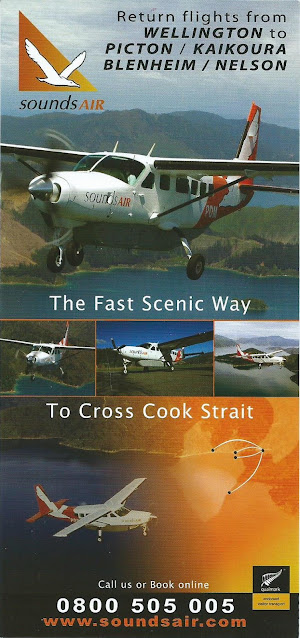.jpg) |
| | Sounds Air's timetable mid 2007 with the Dominion flights to both Nelson and Blenheim included |
|
 |
| The third Caravan... Cessna 208 Caravan ZK-TZR photographed at Omaka on 22 January 2009 |
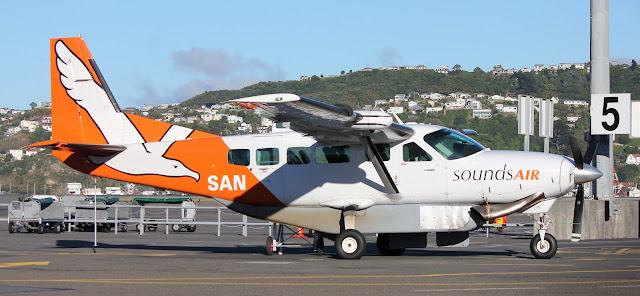.JPG) |
| ZK-TZR was re-registered ZK-SAN on 28 June 2013 and photographed as ZK-SAN at Wellington on 3 April 2014 |
Further expansion to Nelson services occurred in April 2009 with the take-over of Nelson-based Flight Corporation Scenic which provided a range of scenic flights, flight packages and private charters from Nelson. This led to the Cessna 206 ZK-ENT being based at Nelson. Additional services between Nelson and Wellington were added in May and November 2009, February 2010, September 2011 and November 2013 peaking at that time with 23 flights per week.
 |
| Cessna 206 ZK-ENT at Koromiko on 17 November 2007 |
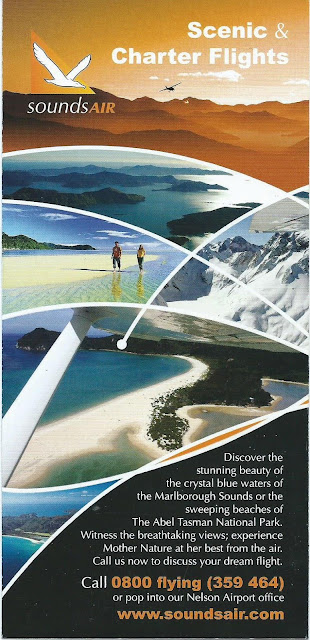.jpg) |
| Sounds Air flightseeing from Nelson after the take over of Flight Corporation |
Sounds Air’s services to Blenheim, like the services to Nelson, began with the introduction of the Dominion Post service on the 9th of January 2006. Evening services between Wellington and Blenheim were introduced on the 11th of April 2008 when Sounds Air began on Fridays and Sundays nights. These flights rapidly gained popularity and additional flights on Monday and Wednesday evenings soon followed. A major expansion to the Blenheim service began on the 1st of August 2011 when Sounds Air added 13 extra return flights a week to and from Wellington in addition to the 10 weekly return flights it already operated. Further flights to Blenheim were added in August 2013 and September 2014 so that peaking at that time with 33 flights per week.
September 2009 saw Sounds Air add a 2000 model Cessna 172, ZK-SAN, to the fleet. This Cessna was IFR equipped and GPS certified enabling it to be used for instrument training and IFR endorsements. In 2010 the company moved to establish an airpark at Picton Airport offering 16 freehold residential sections on farmland it owned behind the airport at Koromiko.
In May 2013 Sounds Air added a second Cessna Grand Caravan to the Fleet. ZK-MJL had previously been operated by Salt Air and Air Milford and it was re-registered to become ZK-SAY when it became part of the Sounds Air fleet. The addition of this aircraft enabled Sounds Air to offer the possibility of dedicated freight flights as well as to offer more charter flights and extra flights at peak times, especially over weekends and during the summer season.
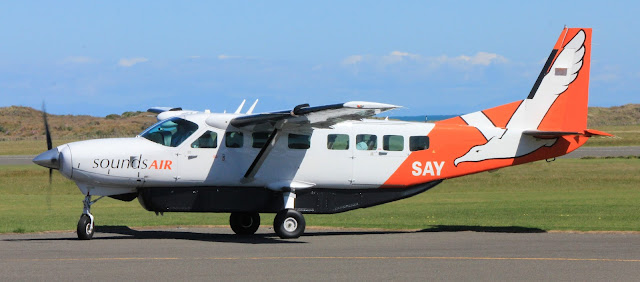.JPG) |
| Sounds Air's fourth Caravan, Cessna 208B Grand Caravan ZK-SAY at Wanganui on 22 October 2014 |
In September 2013 Air New Zealand announced that it was going to withdraw its Auckland to Masterton and Wellington to Wanganui services. Sounds Air explored the possibilities of connecting both Masterton and Wanganui to Wellington but in the end the company decided Wanganui was the only option. A six day a week service between Wellington and Wanganui began on 21st of January 2014. An early morning service was flown to Wellington Monday to Saturday and a return service to Wanganui was flown Sunday to Friday.
 |
| The Sounds Air timetable effective 3 December 2013 |
In February 2014, with the airline growing, Cessna 206 ZK-ENT and Cessna 185 ZK-PRM were registered to Pelorus Air. The new company took over the small piston aircraft and Marlborough Sounds airstrip operations which had been progressively wound back by Sounds Air in favour of the all turbine, mostly IFR Cessna Caravan operations. While Pelorus Air was separated from Sounds Air it still shared the use of Picton Airport to connect to the remote airstrips in the Sounds.
 |
| Pelorus Air Cessna 185 ZK-PRM at Picton on 4 January 2018 |
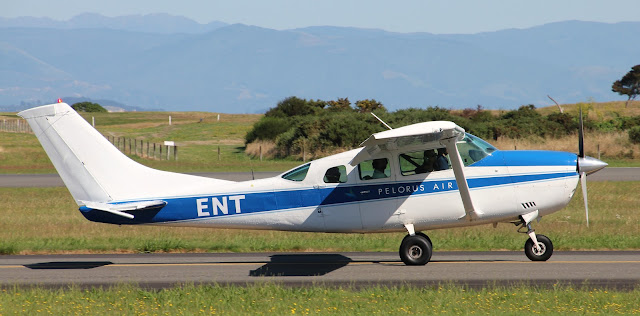.JPG) |
| Pelorus Air Cessna 206 ZK-ENT at Nelson on 24 January 2018 |
From the 1st of September 2014 Sounds Air doubled its weekday flights Wanganui to two flights a day. This schedule increase saw southbound flights departed Wanganui for Wellington at 6.30am and 3.30pm Monday to Friday and at 4.00pm on Sunday afternoons. The northbound services departed Wellington at 9.30am and 7.30pm with a 7.00pm flight on Sunday evenings. All the Wanganui morning and afternoon flights connected with Sounds Air flights to and from Picton, Blenheim and Nelson both in the morning and in the evening. The additional flights were not successful and the schedule was reduced to a single flight each day in early 2015.
 |
| River City Press 17 July 2014 |
In January 2015 a third Cessna Grand Caravan, ZK-SAW, was added to the fleet and from the 26th of January 2015 a new Blenheim-Paraparaumu service was offered. Three flights a day were scheduled each weekday with a single flight on Sundays.
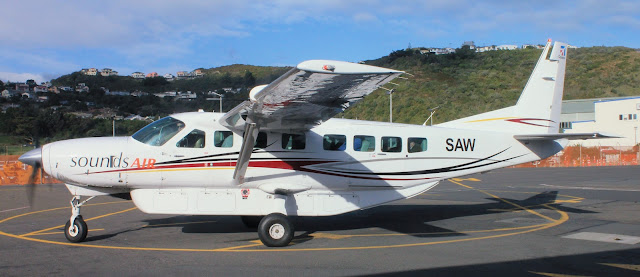.JPG) |
| Sounds Air's third Cessna Grand Caravan, ZK-SAW, at Wellington on 12 June 2015 |
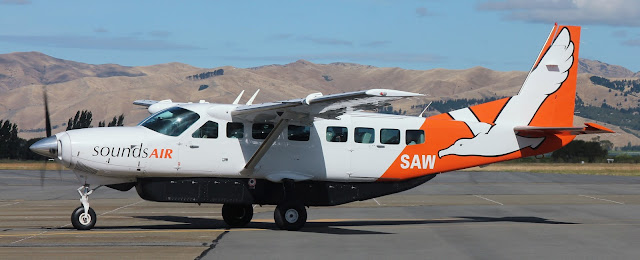.JPG) |
| Cessna Grand Caravan, ZK-SAW, at Woodbourne on 23 February 2017 |
Air New Zealand's withdrawal from the Wellington-Westport and the Wellington-Taupō routes provided a new opportunity for Sounds Air's expansion. The company made six-year agreements with the Buller and Taupō District Councils whereby the local council guaranteed the first three seats per flight. To service the routes Sounds Air company purchased two Pilatus PC-12 aircraft.
The first to arrive was ZK-PLS and this inaugurated air services from Westport to Wellington on the 28th of April 2015 flying SDA 988 from Wellington to Westport and the return SDA 989. The initial schedule saw Sounds Air fly between Westport and Wellington daily, except Saturdays, offering 13 return flights each week. Mondays and Fridays, the busiest days of the week, featured three return flights. On Tuesdays, Wednesdays and Thursdays there were two return flights. On Sundays, Sounds Air offered a late afternoon return flight.
Full coverage of the launch of the Westport service can be found here:
 |
| Pilatus PC-12 ZK-PLS at Westport on 28 April 2015 |
 |
| The Westport schedule effective 28 April 2015 |
 |
Westport News 13 May 2015
|
|
On the evening of 15 May 2015 Sounds Air bowed out of Wanganui. The last flights, SDA 63
from Wellington to Wanganui and SDA 64 from Wanganui to Wellington, were flown in Cessna Grand Caravan ZK-SAA under the command of Jason Eteveneaux.Sounds Air commenced Taupō to Wellington flights on 2 June 2015. Initially three return flights were operated each weekday with two return flights being operated on Saturdays and Sundays. After positioning from Woodbourne the first flight from Wellington to Taupō, SDA 803, was operated by Sounds Air's second Pilatus PC-12 ZK-PLZ under the command of Craig Anderson. Also on the flight deck was Sound's Air's Chief Pilot Willie Sage.
Full coverage of the launch of the Taupō service can be found here:
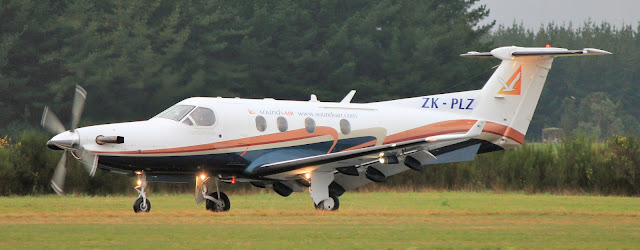.JPG) |
| Pilatus PC12 arrives at Taupō for the first scheduled flight to Wellington on 2 June 2015 |
 |
| The Taupō schedule effective 2 June 2015 |
On the 15th of June 2015 Sounds Air introduced Paraparaumu-Nelson services. The first flight was flown by Tim Johnson in Cessna 208B Grand Caravan ZK-SAY. Two return flights a day were operated on weekdays and one on Sundays. At the same time the Paraparaumu-Blenheim service changed to the same frequencies.
From the 6th of September 2015 the Tuesday and Thursday flights on the Blenheim-Paraparaumu-Nelson were withdrawn.
Sounds Air's third Pilatus PC-12, ZK-PLT, entered service on the 14th of September 2015, ZK-PLT being the first Pilatus to wear full Sounds Air colours.
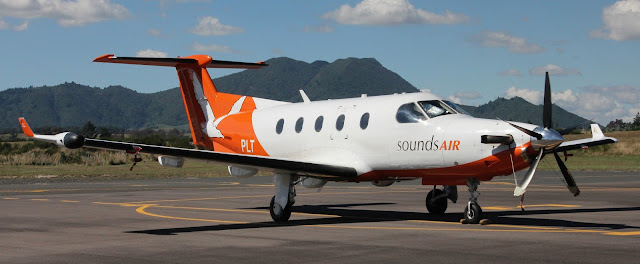.JPG) |
| Pilatus PC12 ZK-PLT at Taupō on 9 March 2016 |
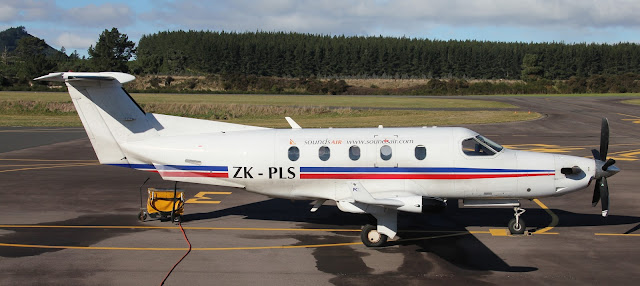.JPG) |
| Pilatus PC12 ZK-PLS at Taupō on 8 August 2016 |
Sounds Air commenced another new air route between Blenheim and Napier on the 5th of November 2015. The inaugural services, northbound SDA712 and southbound SDA713, were flown in Pilatus PC-12 ZK-PLZ under the command of Tim Johnson. Three passengers flew to Napier with eight on the return flight to Blenheim. Six flights a week were flown departing Blenheim at 6.30am and 5pm and Napier at 8am and 6.30pm departures on Thursday and Fridays with a late afternoon return flight on Sundays and an early morning return flight on Mondays.
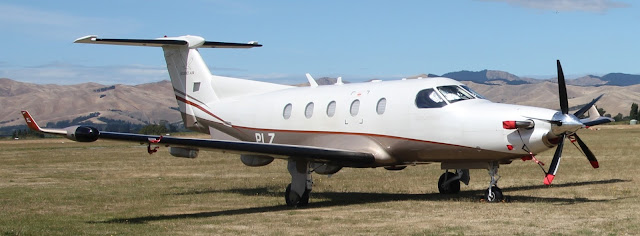.JPG) |
| Sounds Air's corporate Pilatus PC12 ZK-PLZ at Woodbourne on 23 February 2017 |
After the Kaikoura earthquake on the 14th of November 2016 Sounds Air reintroduced services to Kaikoura with a Monday to Friday Blenheim-Kaikoura-Christchurch service beginning on the 21st of November 2016. The Kaikoura-Christchurch sector ceased operating on the 27th January 2017 after the highway to Christchurch was reopened. Sounds Air committed to operate the Blenheim-Kaikoura service until the end of 2017.
 |
| The earthquake schedules effective 21 November 2016 |
 |
| Cessna 208 Caravan ZK-PDM at Kaikoura on 23 February 2017 |
In November 2017 another Pilatus PC12 arrived in Wellington for Sounds Air. With ZK-PLV in service the airline had a fleet of five Cessna Caravans and five Pilatus PC12s.
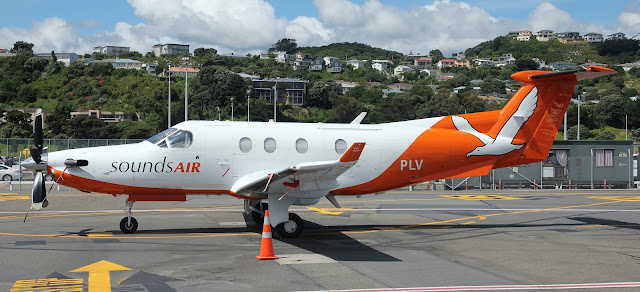.JPG) |
| Pilatus PC12 ZK-PLV at Wellington on 28 October 2017 |
By November 2015 the Wellington to Nelson route had become Sounds Air's second busiest route with 26 flights a week operating between the two centres. The arrival of Jetstar on this route in December 2015 and the resulting air fare war seriously impacted on Sounds Air's traffic and by August 2017 the frequency of services had reduced to 17 flights a week and the route had dropped to become the sixth busiest.
On the 29th of December 2017, following the reopening of State Highway 1 north of Kaikoura, Sounds Air discontinued the Blenheim-Kaikoura air service. The final flights, SDA31 from Blenheim to Kaikoura and the return flight back to Blenheim, SDA34, were flown under the command of Tom Williams in Cessna Caravan ZK-SAN.
In September 2018 Cessna Grand Caravan ZK-SAW was sold.
On the 13th of December 2018 Cessna 525 Citation CJ3 ZK-RJZ was registered to Sounds Air who took over the the operating the jet on behalf of the owner. It was also available to operate charter services for Sounds Air. It operated its first Sounds Air charter flight on the 20th of December 2018 flying from Wellington to Taupō, and then then to Wanaka before returning to Wellington using the callsign SDAJ (Sounds Air Juliet). On the 6th of December 2019 ZK-RJZ was removed from Sounds Air's operating certificate and the aircraft was reregistered to Tirohanga Holdings.
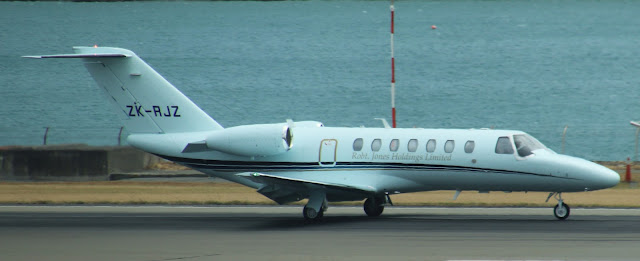.JPG) |
| Cessna 525 Citation ZK-RJZ on arrival at Wellington on 20 February 2019 |
On the 12th of March 2019 Pilatus PC12 VH-YWO flew across the Tasman to Wellington before flying to Omaka with the callsign Sounds Air Oscar. It was finally registered to Sounds Air on the 15th of November 2019 and entered service as ZK-PLB on the 9th of December 2019 when it operated flight S8 651 from Blenheim to Christchurch and the return flight S8 652.
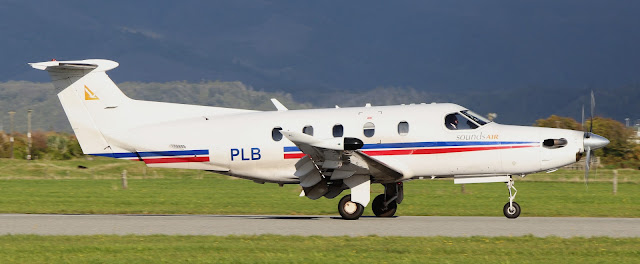.JPG) |
| Sounds Air's Pilatus PC12 ZK-PLB arriving at Westport on 28 April 2021 |
In October 2019 Sounds Air announced its plans to cut its service between Napier and Blenheim. Airline chairman John Stace said, the service is being cut because it was simply not viable to fund the route anymore. We had planes going one way empty and returning with only two to three passengers on board so in the end it wasn't viable." For the retiring chairman he said that it wasn't the way he wanted to step down especially to cut the Napier service, his home region. "It isn't what I wanted to see happen to the route but we had been warning over the last year that it was a matter of use it or lose it." Stace said that while the Napier and Blenheim service wasn't reaching the right numbers, their other services have been booming. "Some of the services we acquired from Air New Zealand have been going off and we need more services available and so that meant having to lose this service to cope with the growing demand in other areas." The final Napier service was operated on the 3rd of January 2020 with Pilatus PC12 ZK-PLB operating flights S8 714 from Blenheim to Napier and the return flight S8 715.
 |
| Sounds Air flight into Napier arrives on 3 January 2020 operated by Pilatus PC12 ZK-PLB |
On the 28th of January 2020 Sounds Air announced an extra service would operate on weekdays between Wellington and Nelson. However, 2020 was the year of Covid-19. On the 22nd of March 2019 Sounds Air announced it was is going to halve its flights after the coronavirus, and attempts to contain the disease, began to take its toll on passenger numbers. Before this happened the whole country was in lockdown and all Sounds Air's scheduled services were suspended, though the airline was able to offer the occasional hospital patient transfer or essential worker charter flight. On the 14th of May 2020 reduced services recommenced between Wellington, Blenheim, Nelson and Westport. On the 18th of May reduced flights commenced between Wellington and
Taupō and between Blenheim and Christchurch. Picton and Paraparaumu services resumed in June 2020. Frequencies across the network have slowly ramped up in the following months.
On the 22nd of August 2020 Sounds Air announced its intention to start services between Wānaka and Christchurch using their Pilatus PC12 aircraft. Sounds Air CEO Andrew Crawford said tickets would be on sale from mid-September, with flights to commence from 2 November 2020. “This is fantastic news, not just for Sounds Air, but for the communities of Wānaka and Christchurch who have been so supportive of this proposed service. The survey we commissioned in June this year showed 90 percent support from the 3,600 respondents, which shows us that we have a ready market for this service." Sounds Air's Wanaka service got airborne on the 2nd of November 2020 with Pilatus PC12 ZK-PLV operating S8 710, the first flight from Wanaka to Christchurch, and the return service flight S8 711. Ten flights each week were operated as follows;
 |
Wanaka schedule effective 2 November 2020
|
With the introduction of the Wanaka flights the Blenheim-Christchurch route was also strengthened with three return flights offered each weekday between the two centres. At this time Sounds Air's reservation system showed a second flight being offered on a Saturday with "no seats available" and this was operated if the the first flight was full. On Sunday evenings two Pilatus PC12s operated the Christchurch to Blenheim 6.20pm service.
 |
| Christchurch-Blenheim schedule effective 2 November 2020 |
February 2021 saw Sounds Air continuing to rebuild their services after the Covid challenges of 2020. According to the airline's reservations systems at that time the frequency of flights was returning to pre-Covid levels with the following frequencies...
Wellington to Blenheim - 39 per flights week
Wellington to Nelson - 19 flights per week
Wellington to Picton - 19 flights per week
Wellington to Taupo - 13 flights per week
Wellington to Westport - 14 flights per week
Blenheim to Christchurch - 18 flights per week
Blenheim to Paraparaumu - 5 flights per week
Christchurch to Wanaka - 10 flights per week
Nelson to Paraparaumu - 4 flights per week
Further frequency increases were announced in May 2021 with the addition of two additional weekly services between Westport and Wellington. Services between Taupō and Wellington saw an additional two weekly frights from the 8th of June 2021 and an additional weekly service between Blenheim and Christchurch was added from the 1st of July 2021.
.JPG) |
| The tarmac at Marlborough Airport, Blenheim of 5 January 2022 where Sounds Air were flying from Blenheim to Christchurch, Wellington and Kāpiti Coast. |
Looking to the future, in September 2019 a Sweden aeronautical company unveiled details of its still under development 19-seat Heart Aerospace ES-19. The all-electric aircraft was expected to be able to fly some 400 km (217 nm) and operate from runways as short as 750 meters (2,461 feet). It was expected to have a top speed of 215 knots and a cruise speed of 180 knots. The company maintained that these low speeds would not be a disadvantage on short sectors, especially because the aircraft would be able to operate from smaller, less crowded airfields that will shorten door-to-door journey times. Sounds Air signed letters of intent to purchase but Heart Aerospace later changed its plans to make the aircraft a 30-seater.
 |
A glimpse of the future??? A mock up of a Sounds Air Heart Aerospace ES-19
|
While there was a gradual rebuilding after Covid Sounds Air was to face further challenges that affected airlines across the world this was reflected in various statements from Sounds Air's CEO Andrew Crawford. In August 2022 Sounds Air offered a $799, all-you-can-fly pass for three months to get people flying at the start of spring. Andrew Crawford, Sounds Air managing director, said about 17,000 seats would be available during the three months. Like other airlines, Sounds Air was flying with empty seats and wanted to fill them. “I'm hoping for a booming summer for this country. I think we really need it,” he said. The idea of a season pass was sparked by a recent trip to the United States. “One thing we really noticed was getting away from Zoom, or Teams or whatever else people are using for meetings, and how good it was to get face to face,” Crawford said. Along with other airlines, Sounds Air relied on government funding during lockdown when air travel was severely restricted. There were concerns the airline would not get a cut of the aviation package, and a petition to 'Save Sounds Air' collected more than 43,000 signatures. But the worst period was early this year after Omicron hit, when aircraft were flying on a more normal schedule, but sickness was still spreading. “It was very, very difficult. When you were locked down, you knew what you were doing. There was no one going anywhere, and you didn't have any cost going out apart from wages. But Omicron was much different to that.” The past two months had seen business starting to get back to pre-Covid levels, although the airline was battling inflation and higher bills, particularly fuel. “Any airline could be better, but we seem to have strong demand. But there are also strong costs out there,” he said. “We've had sickness, but it's sort of rolling sickness. We have 100 staff, so if 10% of them are off it does have a big effect on our business. But it hasn't been too bad so far.”
.JPG) |
| Sounds Air's Pilatus PC12 ZK-PLX arriving into Wānaka on the 31st of October 2023 with flight S8 715 from Christchurch. |
In March 2024 Sounds Air increased fares on its Westport and Taupō routes in response to the extremely challenging economic conditions facing the aviation industry. Sounds Air CEO Andrew Crawford says, “we use a dynamic pricing model across our routes, but the combination of increasing fuel prices, maintenance costs and supply chain issues have been a triple-whammy for the aviation industry and put particular strain on those sectors with tighter financial margins. “While we continue to experience strong demand for our services, the escalating costs have meant that, as a company, we have been subsidising the Wellington to Taupō and Wellington to Westport sectors since COVID-19 hit. Fuel prices alone have added over $2.5 million in cost to our business in the last three years. “We recognise the importance of air connectivity for these regions, so we continue to constructively and pro-actively engage with key stakeholders including District Councils, local business leaders and service providers such as District Health Boards, in an attempt to ensure the ongoing viability of these routes. All options are being considered and include potential co-investment into regional infrastructure. Sounds Air is confident that, with the vital support of both public and private sector partners, it will achieve the long-term sustainability that both the company and these communities need.” Buller District Mayor Jamie Cleine comments, “when Sounds Air alerted me to the company's challenges on the route, I wanted to ensure all key stakeholders had an opportunity to show the importance of a viable air service to our district. The response from that broad stakeholder group was highly positive and reinforced the options available to Sounds Air to build route sustainability. This is a regional connectivity issue, and we must do what we can to support ongoing passenger flights to Westport.” Taupō District Mayor David Trewavas says Sounds Air provides a valuable link between the Taupō district and the capital: “Sounds Air’s flights are vital for connecting our business community and our visitors to Wellington. I’ve flown with them plenty of times over the years when council business takes me to Wellington and can’t speak highly enough of how efficient, friendly and reliable their service is.” Mr Crawford says that passing on a share of the increased operating costs to customers via a $50 increase to the Wellington-Westport and Wellington-Taupo fares is an unfortunate but necessary first step to ensure the ongoing viability of these routes. “By improving our overall return on investment, we will be well positioned to continue investment into the electrification of our fleet and adding additional regional services across the network.”
.JPG) |
Pilatus PC12 ZK-PLV was operating S8 891 from Taupō to Wellington on 7 May 2024
|
.JPG) |
| Sounds Air's Cessna 208 Grand Caravan ZK-SAY at Wellington on 7 October 2024 |
On the 18th of October 2024 Sounds Air announced that it was pulling out of Westport. CEO Andrew Crawford admitted to Stuff Travel it was a "sad day." “We've been doing it now for nine years and really feel we've given Buller tremendous support and they admit that, but the economic climate is such that it's just not tenable. It’s depressing really.” The service had a “pretty reasonable” 65% capacity on flights. The aviation market is the toughest he has seen in his 21 years at the airline: “Post Covid, the combination of staggering jet fuel costs, a weak NZD exchange rate, increasing landing fees and CAA charges, wage pressures, high interest rates, and the dramatic international escalation in the costs of servicing engines have been crippling. This coupled with ongoing supply chain disruptions has been brutal for us, as it has been for Air New Zealand. We currently have two aircraft grounded awaiting parts, with no known delivery dates.” He also stressed a frustration with a lack of government support, having been encouraged to apply for funding through the Provincial Growth Fund and the Regional Infrastructure Fund, but had been rejected twice. Sounds Air confirmed it is dropping the route from December 31. “I don't have the time or the energy (to apply again). It's just (a) very, very long and painful process and I'm not doing it again. When you see the support that the national carrier has gotten over the years and (with) regional aviation, the regional operators are expected to mortgage their properties to support regional connectivity in this country. Frankly, I find it embarrassing.” But he added: “There's no shame in pulling out. I mean at some point you got to make business decisions and this is a decision.” Sounds had recently announced it had overhauled its schedule, which took more than a year of planning, and it had factored in the loss of the Westport service. Buller Mayor Jamie Cleine thanked Sounds Air for its nine years of service, saying it had been “instrumental in connecting Buller with the capital. We recognise the challenging market conditions that have impacted the route and truly appreciate the great service they have provided over the years”.
Three weeks later a further announcement was made that Sounds Air would also withdraw from Taupō. Speaking to Radio New Zealand Sounds Air's Managing director Andrew Crawford said while demand for flights was strong, costs were too high. "Decisions like this are not taken lightly. This has been a very tough call for management and our shareholders," he said. "We have done everything that we can to avoid cancelling these services." Crawford said the company could not pass on massive fare increases or have shareholders subsidise services indefinitely. Sounds Air was not alone in reviewing its regional flights, he said. "Air New Zealand reviews its regional services on a regular basis and Jetstar has made it clear that they do not intend to extend their domestic network to include regional New Zealand." The Wellington to Taupō route was the last the company would can, Crawford said.
Sounds Air's final services to Taupō and Westport were flown on the 31st of December 2024 in Pilatus PC12 ZK-PLZ under the command of Na'ama Gueta. The final Taupō flights were S8 804 from Wellington to Taupō and S8 805 from Taupō to Wellington.
 |
| Sounds Air's Pilatus PC12 ZK-PLZ arrives at Taupō with a full load on the airline's last flight from Wellington, S8 804, on 31 December 2024 |
The final Westport flights were S8 903, from Wellington to Westport, and S8 904 from Westport to Wellington.
 |
Sounds Air's Pilatus PC12 ZK-PLZ at Westport on 31 December 2024 before operating S8 904, the final Sounds Air service to Wellington. Photo : Pete Dickson
|
Sounds Air's relinquishing Westport and Taupō led to the sale of Pilatus PC12 ZK-PLV. It flew its final Sounds Air flights on the 6th of March 2025, flying two return services from Blenheim to Christchurch as S8 643, 644, 641, and the final flight S8 642. It was subsequently sold to an Alaskan owner.
Pilatus PC12 ZK-PLT was withdrawn from Sounds Air service on the 13th of May 2025 for life-extension work. On that day it did 3 return Blenheim-Wellington flights, the last ones being S8 264 to Wellington and the return S8 265 to Blenheim. It positioned to Omaka on the 16th of May.
On the 21st of July 2025 Sounds Air made a major announcement that it was going sell its Pilatus PC12 fleet and end its Blenheim to Christchurch and Christchurch to Wānaka services from the 28th of September 2025. In Sounds Air's press release, managing director Andrew Crawford said, that from the 28 September 2025 it is advancing the sale of its Pilatus PC12 fleet of aircraft, and further reducing its regional services to restore and rebuild the viability of the business. Initiated by Covid, and persisting for the past five years, aviation has been severely hit by an escalating cost and supply chain structure, in conjunction with a very weak New Zealand dollar, that has threatened the viability of all regional airlines and the routes that they serve.
We are not alone in this, Air New Zealand and other regional carriers in New Zealand, and world-wide, have been hit by the same cost increases, and the irony is that our passenger demand has never been stronger. However, aviation is a very price sensitive market and demand would dry up if we tried to pass all of the cost increases to our customers. The recent 145% increase in the passenger service levy from the Civil Aviation Authority is just one example of the endless additional costs being imposed on aviation businesses and their passengers. Having exhausted all other options to restore the viability of the business, we seem to have reached a deadlock - Government appears to believe that private capital markets will step in to sort this out, while on the other hand, private capital markets believe that Government should step in to level the playing field like they do in other parts of the world, in order to maintain essential regional air services.
Faced with these circumstances, we have concluded that we will revert to the model that was established in 1987, when Sound Air was founded - providing high frequency services between the North and South Islands across Cook Strait. We are selling our fleet of five Pilatus aircraft and will expand our Cessna Caravan fleet for the shorter Cook Strait sectors. This is a 'Back to the Future' moment for our Cook Strait operation and our passengers. Having withdrawn our Wellington to Taupo and Wellington to Westport sectors in December 2024, this will mean that our Blenheim to Christchurch and Christchurch to Wanaka services will cease to operate from the 28 September 2025. Each service will operate as normal until the end date. We will continue to operate our original core business with the following return sectors;
Wellington to Blenheim
Wellington to Nelson
Wellington to Picton
Blenheim to Paraparaumu
Nelson to Paraparaumu
We are truly devastated that we have been forced into this position after five years of fighting for a solution. It will mean the loss of a number our dedicated and skilled staff, but we are also hugely disappointed for our incredibly loyal customer base who rely on us to get around New Zealand - not only for tourism and leisure purposes but also for regional access to critical healthcare and higher education, and to do business that contributes to New Zealand's regional economies. However, most people will understand that in business, as in life, sometimes we all have to take a step backwards in order to take a step forward.
 |
| Sounds Air advertising, 29 July 2025 |
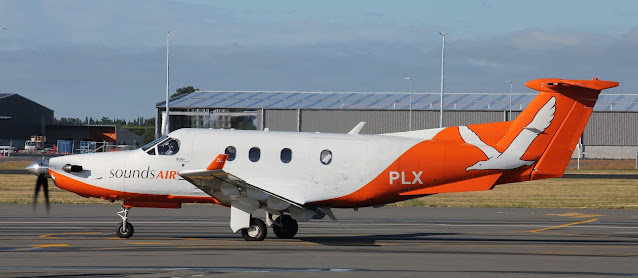.JPG) |
Sounds Air's Pilatus PC12 ZK-PLX was arriving into Christchurch from Blenheim on 4 January 2017
|
The final Pilatus PC12 flights were flown between the 26th and the 28th of September 2025.
ZK-PLZ was withdrawn from service on the 26th. It had a busy final day departing Wellington for Blenheim as S8 297 before operating S8 695 from Blenheim to Christchurch and S8 791 from Christchurch to Wānaka. It then did the northbound flights with the final scheduled departure from from Wānaka as S8 792 to Christchurch and S8 696 to Blenheim. This was followed by its final flights through Kāpiti Coast as S8 412 from Blenheim to Paraparaumu and S8 505 on to Nelson. It then headed back to Blenheim via Paraparaumu as S8 506 and S8 413. It finished the day day flying a return flight from Blenheim to Christchurch as S8 691 southbound and S8 692 northbound back to Blenheim.
The 28th of September 2025 saw the final scheduled day of Sounds Air Pilatus PC12 operations with three aircraft operating to Christchurch, Wānaka, Paraparaumu, Nelson, Wellington and Blenheim for the final time. The 28th also saw Sounds Air withdrawn all its air services to Christchurch and Wānaka.
ZK-PLX started the day at Wellington and departed for Nelson mid-afternoon as S8 375 before doing S8 from Nelson to Paraparaumu as S8 506 and the return flight S8 507. It then operated S8 376 from Nelson to Wellington and then its final flight, S8 291, from Wellington to Blenheim.
ZK-PLB flew from Blenheim to Wellington mid-afternoon as S8 214 before flying what was a return scheduled flight to Picton but which operated to Blenheim as S8 127 and the return S8 128. It then returned from Wellington to Blenheim as S8 213 before doing a another flight to Wellington, S8 268 and then operated the final Sounds Air Pilatus PC12 service, S8 269 with a scheduled departure from Wellington at 8.20pm and arriving into Blenheim at 8.50pm.
ZK-PLS departed Blenheim at 12.30pm and flew to Christchurch as S8 691 and from Christchurch to Wānaka as S8 791 for the final flights to Wānaka. It then operated the northbound services with the final scheduled departure from Wānaka for Christchurch as S8 792 and then a northbound service from Christchurch to Blenheim, S8 692. It then operated a Kāpiti Coast flight, S8 414 from Blenheim to Paraparaumu and the return flight S8 415. It then departed for Christchurch as S8 693 for Sounds Air's final flights to the Garden City. For its last sector of the day ZK-PLS, the PC12 that inaugurated Sounds Air's Pilatus PC12 services on the 28th of April 2015, in a nod to history, was given the honour of doing Sounds Air's final Pilatus PC12 flight, S8 694, departing Christchurch at 8.35pm to arrive into Blenheim at 9.25pm.
Sounds Air is an airline that has grown from finding its niche as a charter carrier to the remote areas of the Marlborough Sounds to being a regional commuter airline offering reliability, safety, a good timetable, good fares, a good relationship and reputation with passengers. It is not afraid to establish new routes nor pull out of them according to opportunities and realistic sound management. While the withdrawal of the Pilatus PC12s was a big step backwards the structure and management of the company will continue to provide a solid foundation for the future as it faces the challenges of being a regional airline in the current economic climate.
Aircraft operated by Sounds Air (present fleet in bold);
ZK-DLA - Britten Norman BN2B-26 Islander (c/n 2131)
ZK-EKE - Cessna 172N Skyhawk (c/n 17269940)
ZK-ENT - Cessna U206G Stationair (c/n U20603667)
ZK-KLC - Gippsland GA8 Airvan (c/n GA8-03-040)
ZK-PDM - Cessna 208 Caravan (c/n 20800240)
ZK-PLB - Pilatus PC12/47 (c/n 725)
ZK-PLS - Pilatus PC12/45 (c/n 363)
ZK-PLT - Pilatus PC12/45 (c/n 379)
ZK-PLV - Pilatus PC12/45 (c/n 400)
ZK-PLX - Pilatus PC12/45 (c/n 396)
ZK-PLZ - Pilatus PC12/45 (c/n 445)
ZK-PRM - Cessna A185F Skywagon (c/n 18504414) ZK-RJZ - Cessna 525 Citation CJ3 (c/n 525B0524)
ZK-SAA - Cessna 208B Grand Caravan (c/n 208B0862)
ZK-SAN - Cessna 172S Skyhawk (c/n 172S8673)
ZK-SAN - Cessna 208 Caravan (c/n 200800360) (ex ZK-TZR)
ZK-SAW - Cessna 208B Grand Caravan (c/n 208B2087)
ZK-SAY - Cessna 208B Grand Caravan (c/n 208B0861)
ZK-TZR - Cessna 208 Caravan (c/n 200800360) (re-registered ZK-SAN)
 |
| Pilatus PC12 ZK-PLZ at Taupō on 22 February 2021 |


.JPG)


.JPG)

.jpg)


.JPG)

.JPG)
.JPG)




.JPG)

.JPG)

.JPG)
.JPG)



.JPG)

.JPG)
.JPG)



.JPG)

.png)
.jpg)
.jpg)

.jpg)
.jpg)
.jpg)
.JPG)



.JPG)
.jpg)
.jpg)
.JPG)

.JPG)
.JPG)



.JPG)
.JPG)
.JPG)
